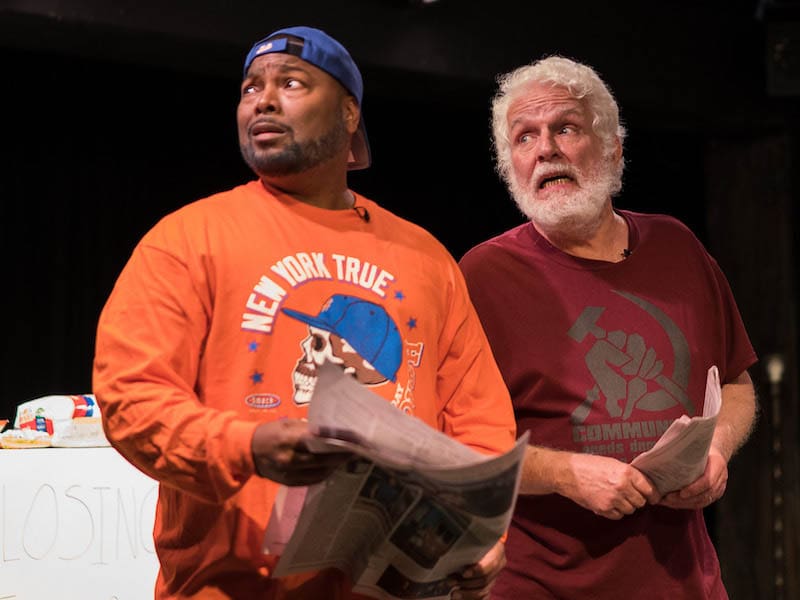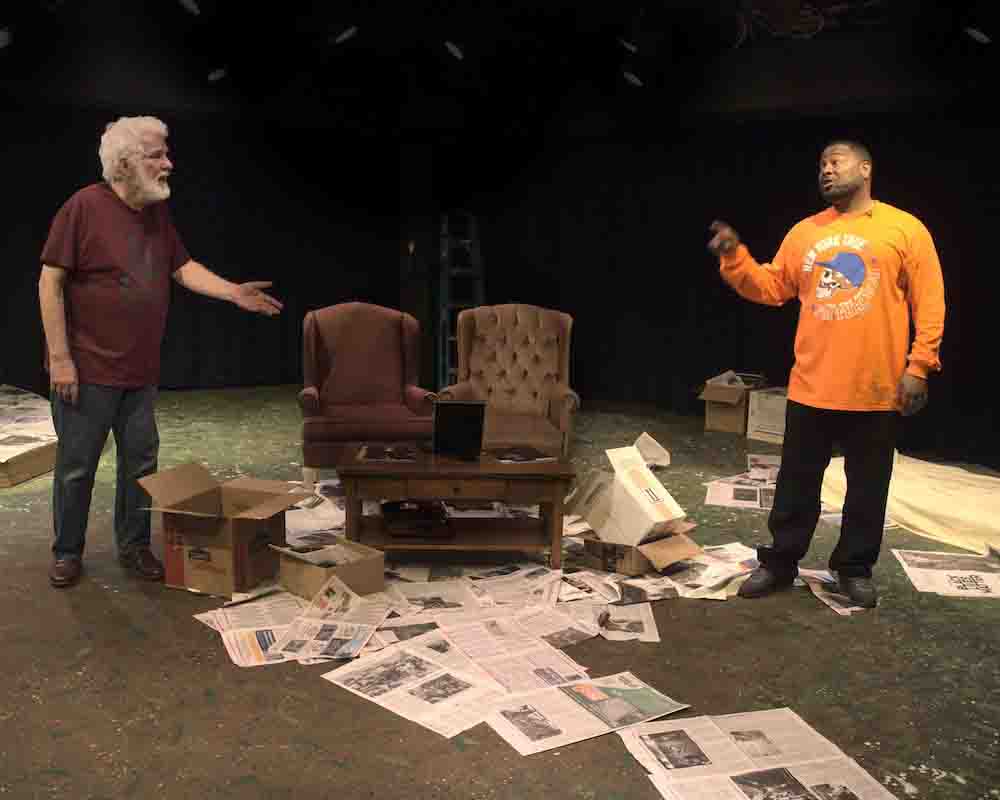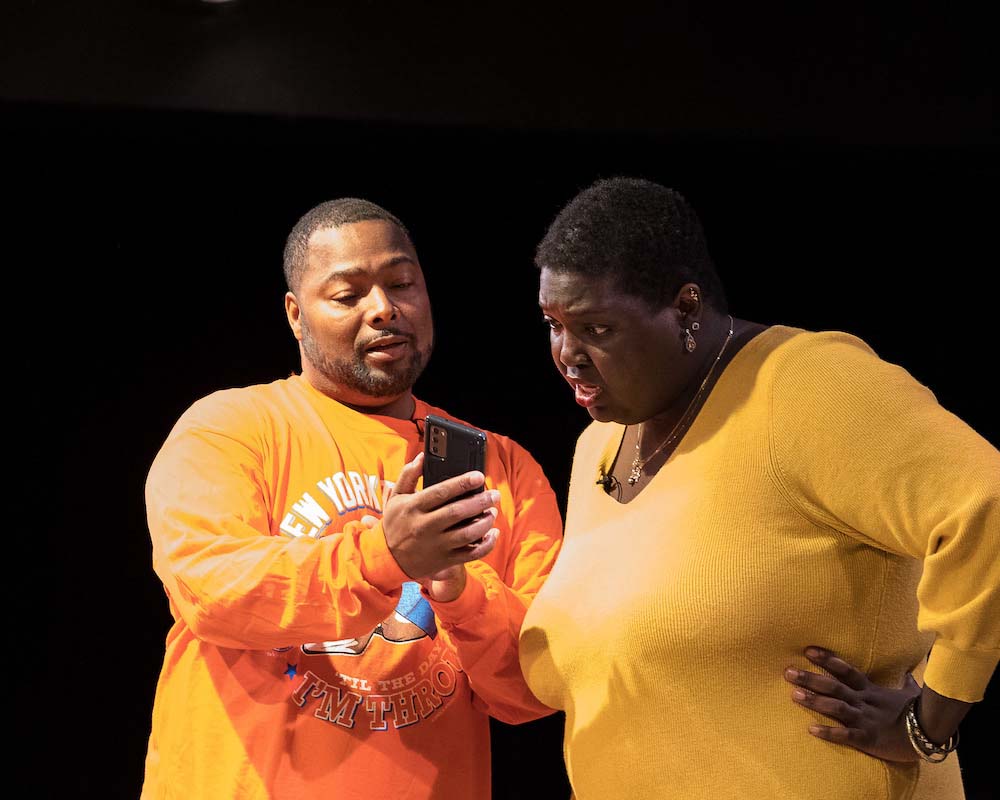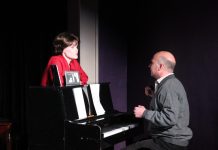There’s a classic Seinfeld episode where Jerry waxes rhapsodic to Elaine over the classic black-and-white bakery cookie. The one that is topped half with chocolate and half with white frosting.

“You see, Elaine, the key to eating a black and white cookie is that you wanna get some black and some white in each bite. Nothing mixes better than vanilla and chocolate. And yet, still somehow racial harmony eludes us. If people would only look to the cookie, all our problems would be solved.”
That too, in a nutshell — or, better, a cookie box — is the premise of Brooklyn-based novelist and playwright Gary Morgenstein’s Black and White Cookie, Silver Spring Stage’s first live performance at its storefront theater in 18 months. Originally programmed as a staged reading with scripts in hand, the October 15–17, 2021, performances instead evolved into a minimally produced show under the direction of Jacqueline Youm.

With thrifted and attic finds for sets, including a worn pair of living room chairs, a makeshift newsstand and posterboard signs, and a ratty mattress, attention focuses on the performers and the play itself.
Harold Wilson has run his own newsstand for more than three decades. With a topical nod to 2020, he had to close for months during the pandemic, but is ready to rebuild, until he receives a rent hike that is infeasible for a single proprietor. His most loyal and eccentric customer, Albie Sands, a lifelong curmudgeon and social protestor with a résumé that included protests at the 1968 Democratic National Convention, 1980s anti-nuclear power plant protests, and a stint as spokesman for the American Communist Party presidential candidate.
Harold, an avid Mets fan who wears his love of baseball on his sleeve, chest, and cap, faces forced retirement if he loses his newsstand. While Albie is both incensed and fired up to break out his 1960s protest tactics. While Albie considers Harold a good friend — Albie has bought a ham and cheese sandwich every morning and takes the previous day’s New York Times for eight years – Harold doesn’t open up easily.
At home Harold’s niece, Carol, learns of this odd-couple partnership after her uncle takes Albie in. When she realizes this interlocutor is Jewish, she echoes some of the more subtle anti-Jewish sentiments Harold expressed. Both uncle and niece have specific traumatic experiences that heighten their distrust of Albie, who seemingly is motivated by memories of his past not money.
The heightened, visceral anti-Jewish epithets feel chilling and disheartening in light of the disturbing increase in antisemitic incidents in the U.S. According to the FBI’s 2019 hate crimes report, of the 1,650 reported hate crime offenses motivated by religious bias in 2019, 60.3 percent were motivated by anti-Jewish bias.
As director Youm penned in her program note: “Though seeds of division rage throughout the land, I hope and pray and ask for us all to see past our differences and work together. I refuse to believe that our divergences will prevent us from achieving our utmost potential and from forging bonds that will stand the test of time.”

Principal performers Melvin D. Smith as Harold, white-bearded Paul Brewster as Albie, and Youm as niece Carol each find a heart center of their individual characters. The supporting ensemble included Robert Howard and Helen Cheng Mao.
A Black and White Cookie clocks in at about an hour and 50 minutes without intermission. It could use some judicious editing and trimming to bring the show down to a more palatable 90 or 100 minutes.
A Black and White Cookie, by Gary Morgenstein, played October 15 to 17, 2021, at Silver Spring Stage, 10145 Colesville Road, Silver Spring, MD. Next up: A Christmas Story, December 10–19, 2021.
SEE ALSO:
Silver Spring Stage returns to live performance with bold 53rd season





